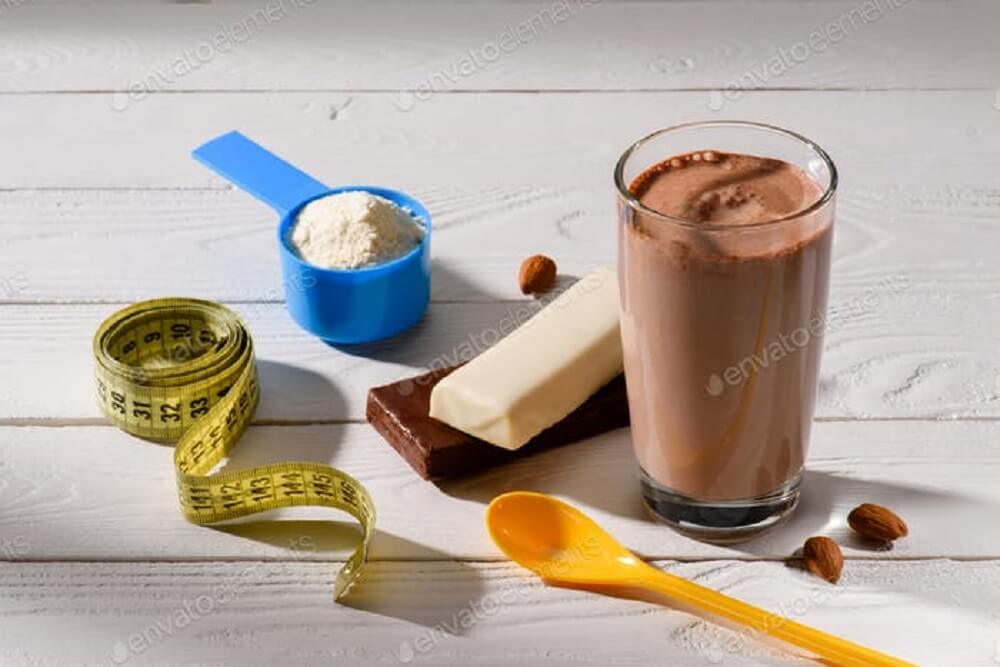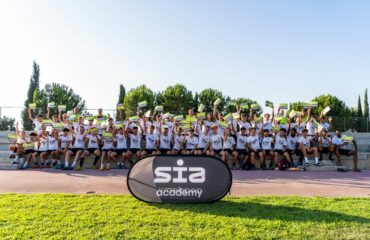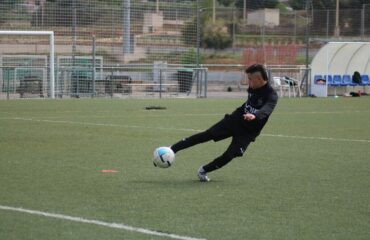In recent years, nutrition has been a source of interest for players and the coaching staff of soccer teams, who are increasingly aware of its benefits. It has also raised the concern of parents with the aim of ensuring the performance and health of their children. Maybe you’re wondering if I’m giving my child the right food? Is it now or not? Is it too late to eat? In this article we will try to explain some of these questions.
The first thing is to understand that the top nutrient in terms of fuel for soccer players would be carbohydrates.
WHAT ARE CARBOHYDRATES?
Carbohydrates also called carbohydrates are the sugars, starches and fibers found in a wide variety of foods such as fruits, grains, vegetables. These are one of the basic food groups and are important for a healthy life.
Carbohydrates provide the body with glucose, which is converted into energy, which in turn is used to maintain body functions and physical activity. These are part of muscle glycogen. It appears that muscle glycogen is the most important source of energy for soccer players. Numerous studies, already classic, reported on the importance of carbohydrates for soccer players’ performance and how muscle glycogen stores were almost completely depleted during the second half of the match.
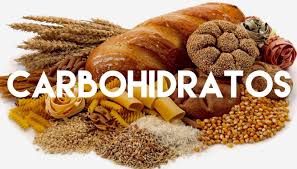
The game requires a high energy expenditure produced, in part, by the high distance travelled during a match. The higher the competitive level, the greater the intensity at which efforts are made and the greater the number of matches played per season. Therefore, if this expense is not compensated, it will directly affect the performance of the players. This is why it is so important to control nutrition during a match, as well as before and after.
Food days before the competition.
During the week before the competition the two main objectives are:
- Optimize the stores of carbohydrates in the muscles and liver (in the form of glycogen) with the fin to compete with a maximum energy reserve.
- Stay well hydrated.
The preparation will be dictated by the type of competition to which you go and the frequency with which you compete.
it has to take into account that an optimal diet for sports performance days before the competition will not be effective if you do not eat a healthy diet over an extended period of time.
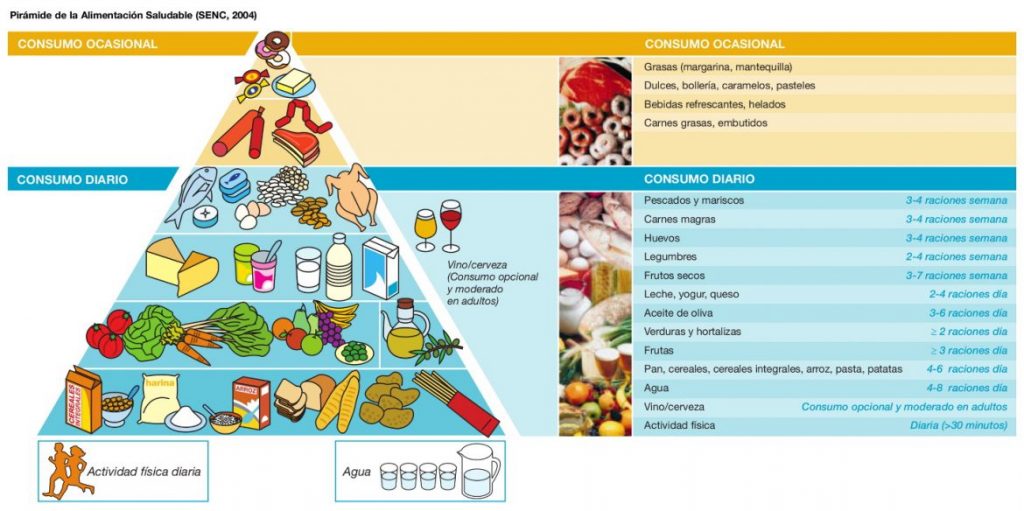
Diet for the days before a football match.
Some of the characteristics that must meet our diet during the days prior to the event are:
- It is very important that you maintain the consumption of carbohydrates to maintain the reserves of glycogen to the maximum.
- Ensure a water intake, drink at least 1.5 a day or until your urine is as clear as possible.
- Do not try any new food and do not change your usual routine.
- Avoid spicy foods and flatulent vegetables such as cauliflower, broccoli, Brussels sprouts, artichokes or leek.
- Avoid eating legumes (lentils, chickpeas…) and foods rich in fiber or whole grains (brown rice, whole grain bread…).
- Reduces the intake of fatty foods or fatty foods such as sausages, fried and battered, sauces or pastries.
- Eat calmly and chew the food very well, to promote good digestion.
- Avoid excess caffeine and alcohol consumption.
As we have seen the energy reserves in our body is one of the main factors when it comes to obtaining optimum performance but what would a menu look like for the previous days?
| 2 días antes | 1 día antes | |
| DESYUNO | 2 rebanadas de pan con mermelada + plátano maduro. | 1 taza de leche desnatada + 1 vaso colmado de muesli + 1 taza de yogurt líquido. |
| ALMUERZO | Bocadillo de pavo con una cucharada sopera de hummus. | Bocadillo grande de bar + barrita energética. |
| COMIDA | 70g de pasta integral con una lata de atún (si quieres salsa de tomate) + 1 vaso de zumo y de postre una galleta. | 70 g de pasta (en preparación que quieras) con 2 filetes de pavo o pollo +1 vaso de zumo. |
| MERIENDA | 1 barrita de cereales + 1 zumo de frutas | 1 sandwitch mixto + 1 zumo |
| CENA | Crema de verduras + 1 filete de merluza + 2 rebanadas de pan + 1 flan | Pure de patatas + 2 filetes de pescado + 2 biscotes de pan + 1 zumo de frutas |
| RE-CENA | 1 yogurt con una cucharada de mermelada | 1 yogurt con una cucharada de mermelada |
Feeding on the day of the competition
The concern should begin at dinner the day before the game. You should have dinner at least 2 hours before going to bed and the food should be easy to digest: cooked pasta or rice, vegetable salad, lean fish or French omelette, fruit or yoghurt or bread, and also don’t forget to drink, mainly water.
On the day of the match, you should take into account a number of recommendations:
- The last meal before the match should be finished at least three hours before, to allow the stomach to digest and avoid gastrointestinal discomfort.
- The menu should consist of foods rich in carbohydrates, without much protein and with little fat.
- Do not eat large amounts
- Avoid sauces, spices and spices.
- It is not advisable to drink a lot of liquid during the meal, because it makes digestion difficult.
- Eat slowly and chew food well.
The meal hours before the competition
A carbohydrate-rich meal taken in the hours leading up to the competition may complete the body’s glycogen reserves.
What should the pre-match meal be like?
- Abundant in simple carbohydrates, such as white bread, cereals, fruit, etc.
- Slightly loaded with protein, digestible and with little fat, such as turkey, fresh cheese, skimmed yoghurt, etc.
- Avoid fatty foods, as they slow down digestion.
- Avoid spicy foods with high fiber content.
- Drink about 2-3 glasses of water or isotonic drink to stay hydrated.
Depending on the time of the match we must take into account some considerations.
- If the match is in the morning:
- Dinner will be more important. It will have an extra contribution of carbohydrates (pasta, rice, bread).
- Breakfast will become the most important meal. It should be light, low in fat and based on carbohydrates.
- If the game is in the afternoon:
- The main meal before a football match must be between 2 – 4 hours before the start. It should be based on carbohydrates and to avoid stomach discomfort, foods low in fibre and fat are preferable.
- Good pasta with tomato sauce, a sandwich with a light stuffing such as turkey, or a rice dish may be good choices as the main meal.
- Until the hour before the match, if you want to have a snack are good options a few pieces of fruit, a yogurt, a cereal energy bar, before training, toasted bread with jam. These foods rich in carbohydrates will help us to fill up the “fuel” tanks.
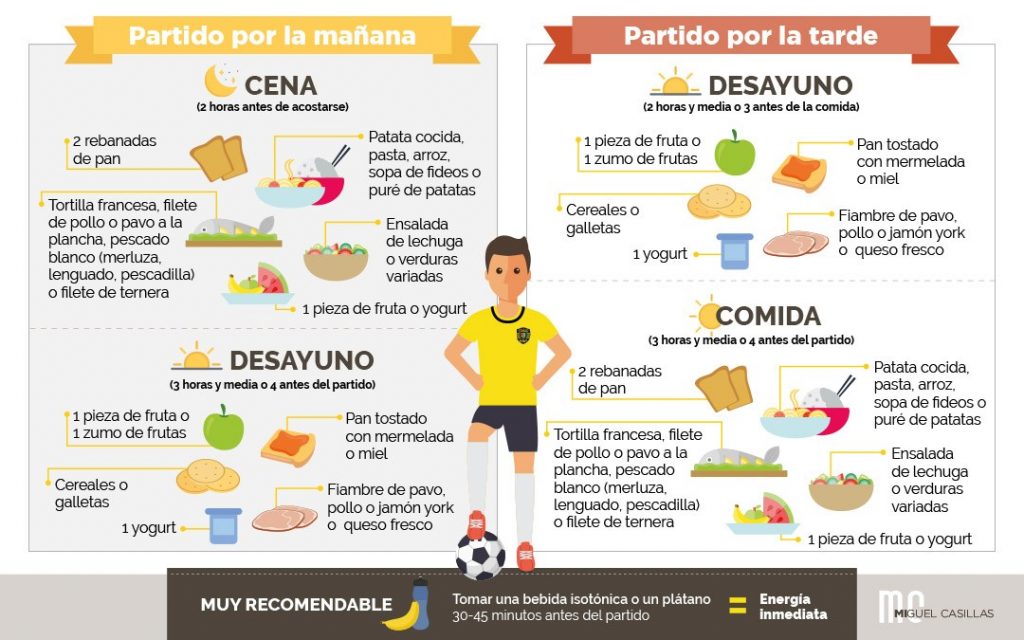
During the match
One of the most researched issues in football, has been the hydration and nutritional intake intra match.
As the minutes of the match go by the muscular glycogen decreases causing fatigue and with this the decrease in the effectiveness of execution of technical and tactical movements. The consumption of carbohydrate drinks in the rest of the game, ensures the hydration of the body and the maintenance of glucose levels in the blood.
Other effective measures to reduce fatigue in the second half is to take around 40g of carbohydrates at rest. But where we can get them:
- 1 gel for athletes
- 1 ripe banana
- 3-4 earrings or dates
- 1 toast with quince jelly
- 500ml isotonic
Normally the majority of footballers do not drink enough during a game, if we pay attention to the losses that can occur. Depending on the weather conditions and the intensity of the match, the losses due to sweating in football players can range from 1 to 4 liters. Therefore the main objective from the nutritional point of view will be to keep the player hydrated.
A loss of only 2% of the initial body weight (e.g. losing 1.4 kg in a 70 kg athlete) due to insufficient recovery from sweating losses can impair the continuous or intermittent running and reduce the performance of football related skills.
A simple way to predict the level of hydration is to control the colour of the urine, the higher the colour, the greater the level of dehydration.
The doubt that arises is to use water or sports drinks. If we do not have a budget, water is better than nothing and can be sufficient for training and competition in cold environments or when the intensity of the match is low or moderate. However, there are several reasons why sports drinks are superior to water as a rehydration drink during exercise. These drinks contain sodium chloride (table salt) and carbohydrates such as sucrose and glucose. When salts and carbohydrates are added to the water, gastric emptying improves, thus improving its transport from the intestine to the blood compared to drinking only water.
Carbohydrates, of course, provide extra energy, especially in the last moments of the game. Also, some players lose a lot of salt by sweating) and this salt has to be recovered if you want to stay hydrated.
When we talk about sports drinks we are not referring to those commonly called ”isotonic” whose sodium intake is less than necessary and excessive in sugars.
Some of our advice are:
- Hydrate yourself correctly, drink little by little between 400ml-500ml of sports drink or water.
- Don’t try new foods or supplements that you haven’t tried before the competition. Inform yourself about the refreshments that will be in the race to know if they are the ones you usually use.
After training or match
During the match our body sweats and burns fat and carbohydrates to produce enough energy to carry out the activity. This causes us to lose too many nutrients and unbalance our body’s levels. If the match has been intense is likely to have lost weight, depending on having lost fluid and is replenished as you drink and feed. It is necessary to eat foods rich in carbohydrates and proteins with a low fat intake throughout the two hours immediately after exercise. In this period the body is more receptive and will assimilate nutrients better. This will produce a muscle reconstruction that will last up to 48 hours.
To help our muscles relax and recover as soon as possible it is important to eat foods rich in potassium such as bananas, dried fruit or vegetables, or you can also turn to the help of multivitamin complexes that will help us quite a bit when it comes to recovering.
Some of the most frequent questions we face are:
1. . What should I eat the week before the match?
Most athletes try to follow a diet rich in complex carbohydrates before a test. That’s why they spend all day eating pasta, rice, whole-wheat biscuits, potatoes, energy drinks, etc. But do not fall into the extremes, the balanced diet does not consist of taking only carbohydrates, you also need to take lipids or fats, protein, vitamins, minerals, fiber, and so on. That is to say, it is necessary to follow a varied diet to be healthy and that you do not lack anything, choosing the foods of better quality for your organism.
What you should eat every day are fruits, vegetables and salads, and intercalating each day at lunch and dinner a second plate of: rice, wholemeal pasta, grilled fish, eggs, legumes, meat (poultry and lean cuts) grilled. For dessert nothing better than a semi-skimmed dairy. And don’t forget to drink 4 or 5 nuts, almonds or hazelnuts every day. If you’re worried about gaining weight, just choose the lightest, nutrient-rich foods within each, for example, choose lean meats rich in protein (chicken) instead of fatty meats, or olive oil rich in healthy fats instead of butter, or whole-wheat pasta rich in complex carbohydrates instead of normal pasta. .
2. Is it important to eat on Friday and Saturday before the match?
Yes, it is time to refill your muscle glycogen tanks, i.e. to charge the batteries for day D. To achieve this, you must eat at least 5 light meals a day, with foods richer in carbohydrates such as pasta, rice, potatoes, combined with vegetables. Remember to drink carbohydrate-rich fruit (bananas, grapes, melons, apples, etc.) and choose lightly digested protein foods such as grilled chicken breast, boiled fish or a French omelette. The rule is that you do not fill up at every meal, it is preferable to eat a little but often, so that the digestions are light.
3. What is the best dinner for the day before?
The traditional dinner of a runner is pasta, always combined with very light sauces (forget the cream and bacon) the best is to take pasta with vegetables, or bolognese with tomato and minced meat and without abusing, or with cockles or clams and minced garlic. Try to continue with the rule of balance, eating just enough to satisfy yourself and without feeling heavy.
4. . What do I have for breakfast on match day?
It is very important the breakfast of the day of the match, remember to respect the rule of the three hours of digestion, reason why you must have breakfast at least two hours or three before practising a sport. That means getting up early on a Sunday, as the race is at 10:00, you should have breakfast at 7 or 7:30 at the latest, and it’s not worth having a coffee at 9:00 and running off to the concentration. What you should never do is have something different for breakfast than every day, so start eating this breakfast at least 15 days or a month before the race, to get your intestine used to the morning digestion.
The ideal breakfast should combine carbohydrates with protein, and the usual thing is to take an orange juice, a yogurt with cereals type muesli, natural fruit and some dry fruits. You can have tea with honey or coffee and it is advisable to start drinking one or two glasses of water.
5. Is it good to drink coffee to perform better
Caffeine is a double-edged sword. On the one hand, it is a stimulant that in moderate doses helps to obtain more energy for movement, although it is not clear whether it acts alone on the nervous system or also intervenes in energy metabolism. On the other hand, it is a diuretic that can accelerate dehydration and worsen sports performance. The best advice is not to abuse caffeine, if you are used to breakfast a coffee, you can drink it, provided you can go to the bathroom before the race.
6. . Should I eat something just before competing?
You shouldn’t run on an empty stomach, but you shouldn’t run on a full stomach. Some footballers have gotten used to taking an energy bar, raisins or a banana just before training, and they’re doing well, but it’s really not necessary if your diet the days before this event have passed normally.
7. How should I hydrate?
It depends on your effort level, the temperature of the day, humidity, your hydration level before the race, etc. The rule is to drink before you are thirsty, and nothing better than to start the days before to hydrate to make sure you are not going to suffer dehydration, have breakfast with a glass of water, and continue drinking water until half an hour before the race (remember to go to the bathroom before going out) If the day is hot, do not forget to drink water every 20 minutes during the race, to replace the loss of fluids by sweating. And when you finish, you know: drink more water.
8. What eat if I’m on a weight-loss diet?
If your goal is to lose weight, moving is your best weapon in front of the scale, although it’s hard to tell in an hour. The calorie expenditure depends on the exercise chosen, the time and intensity at which you move in general, and your weight, age, height, sex, percentage of muscle mass, in particular. The good news is that football is optimal for amplifying this weight loss. If you control your entire diet and increase the intensity, you will burn more calories per minute.
Miquel Pérez Martí. Dietitian-Nutritionist. CV849.
Dragon Force Valencia.



